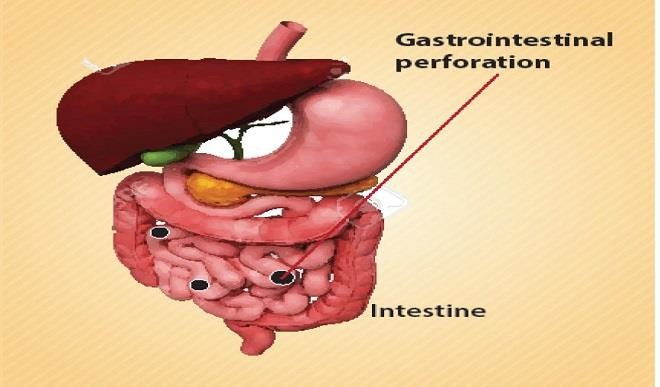
A friend of mine died recently and an X- ray conducted on him the same day he died showed that he had gastrointestinal perforation. Please I need information about this problem.
Habu Z.
Thanks Mr Habu for your question, “Gastrointestinal perforation (GP) occurs when a hole forms all the way through the stomach, large bowel, or small intestine. It can be due to a number of different diseases, including appendicitis and diverticulitis. It can also be the result of trauma, such as a knife wound or gunshot wound. A perforation may also occur in the gallbladder. This can have symptoms that are similar to the symptoms of a gastrointestinal perforation.A hole in the gastrointestinal system or gallbladder can lead to peritonitis. Peritonitis is inflammation of the membrane that lines the abdominal cavity.” (Healthline.com)
It happens when any of the following enters the abdominal cavity:
1. Bacteria
2. Bile
3. Stomach acid
4. Partially digested food
5. Stool
It is a medical emergency that requires immediate medical care. The condition is life-threatening. It can also be called intestinal perforation or perforation of the intestines.
Some symptoms are:
1. Severe stomach pain
2. Chills
3. Fever
4. Nausea
5. Vomiting
When one has a gastrointestinal perforation and peritonitis occurs, the abdomen feels very tender. Pain often worsens when someone touches or palpates the area or when the patient moves. Pain is generally better when lying still. The abdomen may stick outward farther than normal and feel hard.
In addition to the general symptoms of perforation, symptoms of peritonitis may include:
1. Fatigue
2. Passing less urine, stools, or gas
3. Shortness of breath
4. A fast heartbeat and dizziness
Problems that can cause the perforation are:
1. Appendicitis, which is more common among older persons.
2. Diverticulitis, which is a digestive disease.
3. A stomach ulcer.
4. Gallstones.
5. Gallbladder infection.
6. Inflammatory bowel diseases such as Crohn’s disease or ulcerative colitis, which is less common.
7. Inflamed Meckel’s diverticulum, which is a congenital abnormality of the small intestine that’s similar to the appendix.
8. Cancer in the gastrointestinal tract.
The condition may also be due to:
9. Blunt trauma to the abdomen.
10. A knife or gunshot wound to the abdomen.
11. Abdominal surgery.
12. Stomach ulcers due to taking aspirin, nonsteroidal anti-inflammatory drugs, and steroids (more common in older adults).
13. Ingestion of foreign objects or caustic substances.
14. Smoking and excessive use of alcohol increase your risk of GP.
15. Rarely, the condition may occur due to bowel injuries from an endoscopy or colonoscopy.
How to diagnose the perforation?
-X-rays to check for air in the abdominal cavity.
-CT scan to get a better idea where the perforation might be.
-Also blood samples are taken to look for signs of infection as well as assess kidney and liver functions.
-Surgery is necessary to close the hole and treat the condition.
Complications of perforation include:
1. Bleeding
2. Sepsis, which is a life-threatening bacterial infection.
3. Abscesses in the belly.
4. A wound infection.
5. A bowel infarction, which is the death of part of the bowel.
Wound failure may occur in some cases. “Wound failure” means the wound can’t or doesn’t heal. Factors that increase the risk of this include:
1. Malnutrition, or poor diet and smoking and excessive alcohol use.
2. Drug abuse
3. Poxor hygiene and sepsis
4. Obesity
5. Hematoma, which occurs when blood collects outside the blood vessels
6. Type 2 diabetes
7. Steroid therapy or the use of corticosteroids, which are anti-inflammatory drugs that suppress the immune system and can mask an ongoing infection and delay diagnosis.




